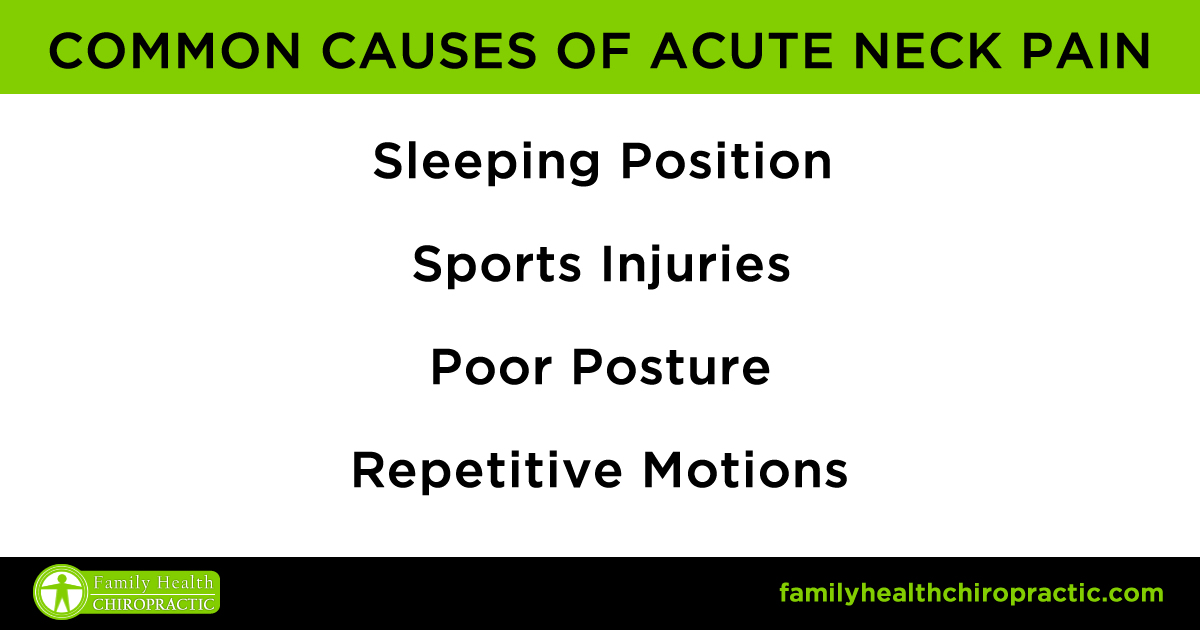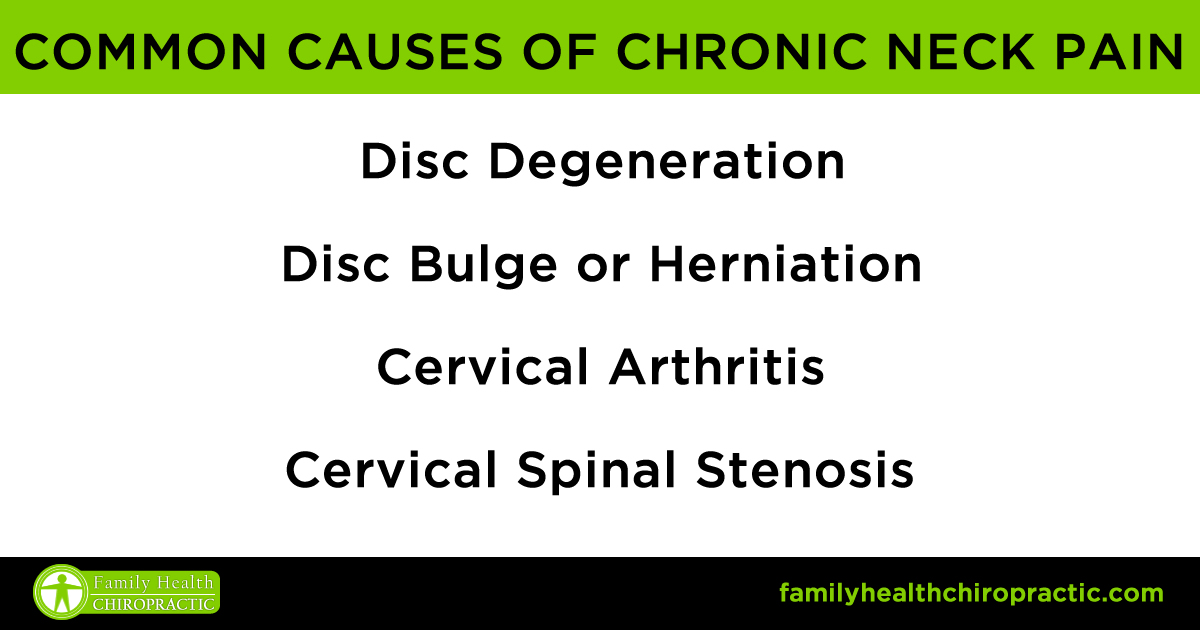Neck Pain can be pretty scary. In fact, we fear spine pain more than we fear other kinds of pain. Our backs and necks are vulnerable and there's a lot of stuff that can go wrong – yet most cases are not serious; at least for the time being.
This article will help to explain the most common causes of neck pain and when you need to worry.
That said, if you're currently experiencing severe neck pain, you've been in an accident or experienced head truama… you should get yourself checked out.
Common Causes of Neck Pain
The causes of neck pain can be divided into acute (sudden onset), chronic (pain that lasts longer than 6 weeks) and external factors (rare but possible).
Acute Causes of Neck Pain
The most common cause of acute neck pain include strains and sprains. These injuries will usually heal withing a few days or weeks and result from overuse.
Examples of acute causes of neck pain include:
- sleeping in the wrong position – most would call this a “crick” in the enck
- sports injury – sudden movements, jerks, collisions or falls that injure the muscles, ligaments and tendons of the neck
- poor posture – this should be obvious, especially considering how much time we spend on computers, smart phones or tilting our heads forward all the time
- repetitive motions – keeping your head turned to a certain side all the time or constantly placing your head in a certain position
Chronic Causes of Neck Pain
Neck pain is considered chronic when it persists for more than 3 months. But if you're having neck pain that lasts longer than 6 weeks, it could be due a number of more serious problems.
Common causes of chronic neck pain:
- cervical degeneration of the disc – our spinal discs act as shock absorbers and depending on our physical activity, we can wear them out. Once they're worn down, painful irritation of the nerves, muscles, ligaments and tendons will ensue.
- cervical bulge of the disc – abnormal forces, poor posture, sudden movements or injuries similar to a sprained ankle can occur to the discs of our spine. When this happens, the disc begins to swell and can cause pain.
- cervical herniated disc – these discs can also tear, allowing fluid that is within them to leak out and irritate spinal nerves, muscles, ligaments and tendons
- cervical arthritis – when the cartilage between the joints of your neck wears down enough, it can lead to cervical osteoarthritis, also known as cervical spondylosis.
- cervical spinal stenosis – Spinal stenosis occurs when the spine’s degeneration leads to a narrowing of the spinal canal, such as from a herniated disc that pushes into the spinal canal or bone spurs that grow into the canal. When the spinal canal narrows enough to compress the spinal cord—a large bundle of nerves that runs inside the spinal canal—myelopathy can result.
External Factors or Other Causes of Neck Pain
- emotional stress – almost everyone carries their stress in their neck and shoulder muscles. Muscles in the neck can tighten up and ache in response to stress, anxiety, or depression.
- infection – in some cases, bacteria or viral infections can cause inflammation of the neck soft tissue. Examples would include meningitis.
- myofascial pain – this chronic condition has trigger points, which result from achy muscles and surrounding connective tissues, typically in the upper back or neck.
- spinal tumor. A tumor, such as from cancer, could develop in the cervical spine and press against a nerve.
- spondylolisthesis. This condition occurs when one vertebra slips over the one below it. It can be due to a tiny fracture in the vertebra, or possibly from advanced disc degeneration, or ligament laxity.
When You Should Worry About Neck Pain
Although it’s rare, the pain we experience in our neck could be a sign of something more serious.
This can include cancers, infections, autoimmune diseases, or some kind of structural problem like spinal cord injury or a threat to an important blood vessel.
These deadly or ominous situations usually have hard-to-miss signs and symptoms other than pain and are likely to be diagnosed correctly and promptly by a qualified practitioner — so, if it feels serious, go get checked out.
Here's a good rule of thumb to know when you should get checked by a doctor:
- it’s been bothering you for more than about 6 weeks
- it’s severe and/or not improving, or actually getting worse
- there is at least one other “red flag” (see below)
- you've lost function in your upper limbs (arm strength, grip strength, the ability to move)
And there is one (hopefully obvious) situation where there’s no need to wait several weeks before deciding the situation is serious: if you’ve had an accident with forces that may have been sufficient to fracture your spine or tear nerves.
Here's a red flag checklist that you can use. The more you check off, the more serious you should get about checking in with a doctor:
Light tapping on the spine is painful.
Weight loss without dieting is a potential sign of cancer.
Mystery fevers and/or chills (especially in diabetic patients).
A fierce headache, and/or an inability to bend the head forward (look down), and/or fever, and/or altered mental state are all symptoms of meningitis (inflammation of the membranes covering the brain and spinal cord, caused by infection or drug side effects).
A severe headache that comes on suddenly! Most are harmless, but they should always be investigated.
Severe, novel pain (throbbing or constrictive) may be caused by an artery tear with a high risk of a stroke. Pain is the only symptom of some tears! Most but not all cases are sudden, on one side, and cause both neck and head pain (in the temple or back the skull), but the pain is usually strange. Any hint of other symptoms, Go to the ER.
There are many possible signs of spinal cord trouble in the neck with or without neck pain, mostly affecting the limbs in surprisingly vague ways that can have other causes: poor hand coordination; weakness, “heavy” feelings, and atrophy; diffuse numbness; shooting pains in the limbs (especially when bending the head forward); an awkward gait. Sometimes people have both neck pain and more remote symptoms without realizing they are related.
Unexplained episodes of dizziness and/or nausea and vomiting may indicate a problem with stability of the upper cervical spine. (Such symptoms should never be dismissed by alternative health professionals as “detoxification” or “healing crisis.”
Steroid use, other drug abuse, and HIV are all risk factors for a serious cause of neck pain.
If you are feeling quite unwell in any other way, that could be an indication that neck pain isn’t the only thing going on.
The main signs that neck pain might caused by autoimmune disease specifically include: a family history of autoimmune disease, gradual but progressive increase in symptoms before the age of 40, marked morning stiffness, pain in other joints as well as the low back, rashes, difficult digestion, irritated eyes, and discharge from the urethra.





